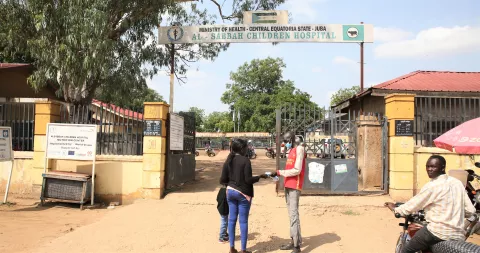Health workers trained to identify and prevent Gender Based Violence in rural communities
Midwives and nurses taught to provide treatment and counselling on rape and HIV prevention in the Upper Nile.

“As a nurse for 26 years, I’ve seen a lot of things in my life,” says Jachinta Ajak, a 48-year-old grandmother who has lived through some of the most trying times in this conflict wracked country. She has also had the unpleasant job of treating the victims of the violence.
“As a mother and a grandmother with 10 children and three grandchildren, I am very happy that the days of fighting are behind us, but I am sad that rape is still an issue in many communities,” she says, shaking her head slowly, her bright eyes clouding over with pain.
Civilians have borne the brunt of subnational fighting that has plagued South Sudan since its independence in 2011; and violence against women and girls remains high.
Providing support to victims is an even bigger challenge in the remote regions of the country like Upper Nile and Jonglei States, where medical facilities and treatment options are few and far apart.
To address this, UNICEF works with the Ministry of Health and partners like the World Bank to empower and train health workers, including midwives and nurses to detect, treat, and to prevent gender-based violence (GBV).

“This training is very helpful because not only can we provide treatment to the victims, but we also counsel family members,” says Jachinta referring to the recent two-week training conducted in Malakal, the capital of the State.
The training conducted this quarter was attended by 16 health personnel who are working in the most remote counties in the Upper Nile State (some counties are only accessible by boat). Health workers are taught to provide counselling to victims of GBV and to provide referrals. In many instances, the health workers are the only connection to the outside world for many of the women who come in for treatment.
“The training this week is focussed on the detection and prevention of HIV, and the training last week centred on the clinical management of rape,” said Chandi Wani Sagu, UNICEF’s health officer in the Malakal Field Office. “Many of the attendants here have come from other counties for the residential training and they are very committed to the work they do,” he says.
The training comprises treatment for sexual violence, provision of post exposure prophylaxis to prevent HIV and antibiotics to prevent pregnancies and sexually transmitted diseases.

“The most important aspect of the training is how to provide counselling. Raising awareness in communities about the detrimental effects of gender-based violence, and equipping women and girls with knowledge on what they can do to protect themselves is as important as providing treatment,” says Chandi.
The joint programme with the Ministry of Health, the World bank and UNICEF supports a vast array of health services in Upper Nile and Jonglei States. Since its inception in 2018, key programme achievements include increasing immunization rates in Upper Nile through a centralized cold chain centre for safe storge and deployment of vaccines and training for community mobilizers to promote health and immunization campaigns. The programme also includes provision of medicines, nutritional supplies, medical equipment for the hospitals and health care centres, and training of health workers including mid-wives and nurses on raising awareness and preventing HIV and GBV.




